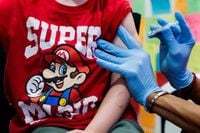As measles outbreaks sweep across the United States in 2025, the nation finds itself at a crossroads over childhood vaccination policies, public health, and trust in federal authorities. Recent polls reveal that while a clear majority of Americans still support mandatory vaccination for schoolchildren, skepticism and hesitancy are on the rise, fueled by political shifts, leadership changes, and a surge of misinformation.
According to a new poll conducted by the Annenberg Public Policy Center in April 2025, 70% of American adults now support school mandates for the measles, mumps, and rubella (MMR) vaccine. This marks a notable increase from 63% in 2023, reflecting heightened concern as the country faces its worst measles outbreak in nearly three decades. The poll, involving 1,653 adults, found that only 18% believe parents alone should decide whether to vaccinate their children attending public schools, even if such choices put others at risk. As one respondent put it, the main reason for supporting mandates was "the potential risk for other children and adults when children are not vaccinated."
Yet, beneath this broad support, worrying trends are emerging. A Washington Post-KFF poll released on September 15, 2025, found that one in six American parents has delayed or skipped some or all standard childhood vaccines for their children. About 9% have opted out of polio or MMR shots, with most citing fears about side effects or a lack of confidence in federal health authorities. This hesitancy is most prevalent among parents under 35, those who identify as Republican, cite religious beliefs, or homeschool their children.
The consequences of these choices are becoming painfully clear. The United States experienced more than 1,400 confirmed measles cases in 2025, the highest tally in over 30 years, and at least three deaths—including two young children. In Oconto County, Wisconsin, a measles outbreak climbed to 36 cases by mid-September, all among unvaccinated individuals, with two hospitalizations. Just last week, Los Angeles County reported a measles-related death in a school-aged child. Public health experts warn that the erosion of vaccine coverage risks turning back the clock on diseases once thought controlled or eliminated.
Despite these outbreaks, the debate over vaccine mandates has intensified at the highest levels of government. In early September, Florida became the first state to eliminate vaccine requirements for school attendance. Florida Surgeon General Joseph Ladapo, MD, PhD, was blunt in his criticism, declaring that vaccine mandates "drip with disdain and slavery." This move has sparked concern among public health officials, who fear that other states may soon follow suit.
At the federal level, Health and Human Services Secretary Robert F. Kennedy Jr. has emerged as a polarizing figure in the vaccination debate. Kennedy, a long-time critic of vaccine mandates, reiterated his opposition earlier this month, stating that "parents need to consider the pros and cons of childhood vaccines." In the Make America Healthy Again Commission report released last week, he added, "Many of them have concerns about the appropriate use of vaccines and their possible role in the growing childhood chronic disease crisis." His stance stands in stark contrast to the growing support for school vaccine mandates reflected in recent polling.
Kennedy’s actions as HHS Secretary have gone beyond rhetoric. In 2025, he moved to restrict access to COVID-19 vaccines and removed CDC director Sue Monarez over disputes about immunization guidelines. These decisions rattled public health circles and prompted California, Washington, and Oregon to form the "West Coast Health Alliance" in September 2025. This new coalition aims to develop its own vaccine recommendations in partnership with scientists and medical associations, signaling a growing rift between state and federal health policy.
Public confidence in federal agencies has taken a hit. The Washington Post-KFF poll found that 51% of Americans are not convinced the Centers for Disease Control and Prevention (CDC) and the Food and Drug Administration (FDA) can ensure vaccine safety and effectiveness. This erosion of trust has further complicated the nation’s response to outbreaks and undermined efforts to boost immunization rates.
Senator Bill Cassidy of Louisiana, a physician and chair of the Senate Health, Education, Labor, and Pensions (HELP) Committee, has pushed back against the tide of skepticism. In a letter sent to Secretary Kennedy in early September, Cassidy urged him to publicly support the diphtheria, tetanus, and acellular pertussis (DTaP) vaccine. "In my state of Louisiana, we are experiencing the worst pertussis outbreak in 35 years. The outbreak has already killed two babies," Cassidy wrote. "I want to work together to stop pertussis. Your strong public support for this vaccine will save lives." Cassidy has also taken to social media to promote the benefits of measles and RSV vaccination, hoping to counteract the surge of misinformation.
Meanwhile, the CDC's Advisory Committee on Immunization Practices (ACIP)—now staffed with several vaccine skeptics after a revision by Kennedy—is scheduled to meet in mid-September to discuss recommendations for the MMRV (measles, mumps, rubella, and varicella), hepatitis B, and COVID-19 vaccines. The outcome of these meetings could shape national vaccine policy for years to come. Sue Monarez, the ousted CDC director, is also set to testify before the Senate health committee this week, a session sure to draw scrutiny from both sides of the debate.
Despite the controversies, the majority of Americans remain committed to vaccination as a cornerstone of public health. The Washington Post-KFF poll found that 81% of parents still support public school requirements for measles and polio vaccines. Yet, the growing divide—between those who see vaccines as essential protection and those who question their safety or necessity—threatens to undermine decades of progress.
As the nation grapples with rising outbreaks and shifting policies, the stakes could hardly be higher. With public trust in health authorities wavering and political leaders at odds, the fight over vaccines has become a defining issue in American life. Whether the country can bridge these divides—or whether preventable diseases will continue their resurgence—remains an open question, but the choices made now will echo for generations.

